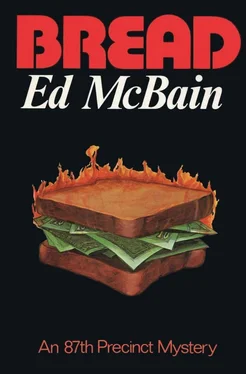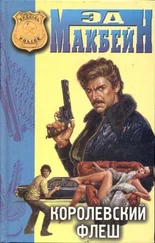To the right of the entrance foyer was a kitchen, sleek with Formica and walnut, brushed chrome, white vinyl tile. The thick pale blue carpet that began in the entrance foyer ran completely through the rest of the apartment. Knee-deep in it, or so it seemed, the detectives waded into the living room, where a lacquered white sectional couch nestled into the right-angle corner of the room, its cushions a deeper blue against drapes the color of the carpet. A huge modern painting, all slashes and streaks, reds, blacks, whites, and varying shades of blue, hung over one section of the couch, illuminated by a pale white sculpted floor lamp operated from a mercury switch at the door. There was a walnut bar lined with glasses unmistakably designed in Scandinavia, glistening against a bottled backdrop of expensive whiskeys and liqueurs. Floor-to-ceiling walnut bookshelves covered the wall opposite one section of the couch, stacked with titles Ollie had meant to read but had never got around to.
A record turntable, a tape deck, an amplifier and a pair of speakers at either end of the room comprised Hemmings’s stereo system, and one long shelf on the bookcase wall contained at least two hundred long-playing albums and as many tape cartridges. At the far end of the room, serviced through a swinging door that led to the kitchen, was an oval walnut table with four chairs around it. A hanging buffet, waist-high, walnut and black Formica, was on the wall behind the table. A second painting hung just above the buffet, positioned off-center, starkly abstract, repeating the color combinations of the larger painting across the room — red, black, white, and blue.
The bedroom was spartanly furnished, a low king-sized white lacquered bed with dark blue spread, pale blue carpet growing all around it, pale blue matching drapes at the window, a walnut dresser with a white Formica top, a small, low easy chair upholstered in nubby black, a closet with slatted doors painted white and occupying the entire far wall of the room. The bathroom was entirely white. White tile, white fixtures, white shower curtain, white shag oval rug near the tub, white towels.
That was it. The apartment had most likely been composed of five rooms before the walls were knocked out and the space redivided. There were now three rooms and a bath, in addition to the small foyer. The renovation had undoubtedly cost Diamondback Development thousands and thousands of dollars.
“Nice,” Ollie said.
“Yeah,” Hawes said.
“Mmm,” Carella said.
Each man was thinking of his own salary.
“Let’s check out the closets and drawers,” Hawes said.
They were starting for the bedroom again when Ollie stopped dead in his tracks. “Somebody’s coming,” he whispered. Neither Hawes nor Carella had heard a thing. They listened now, heard footsteps on the stairs outside, the clatter of high heels approaching the kicked-in entrance door. Ollie had moved swiftly to the left of the door, and was standing against the mirrored wall, pistol drawn. He motioned Carella and Hawes to get out of sight.
In the hallway outside, they heard a small exclamation of surprise.
“Get in here,” Ollie snapped.
A girl stepped into the entrance foyer. She was a tall, attractive redhead, white, perhaps twenty-five years old. She was wearing a long green evening gown and green satin slippers, Cinderella returning from the ball at five in the morning to find the place full of burglars, or so it must have seemed to her. “Take anything you want,” she said immediately, “but don’t hurt me.”
“We’re police officers,” Ollie said, and the girl’s mood and temperament changed at once.
“Then get the hell out of here,” she said. “You’ve got no right breaking in here.”
“What’s your name?” Ollie said.
“What’s yours?” she answered.
“Detective First Grade Oliver Weeks, 83rd Squad,” he said, and holstered his gun and showed his identification. “I still don’t know your name.”
“Rosalie Waggener,” she said, and walked past the detectives and into the living room, stepping out of her shoes as she went and padding barefooted to the bar, where she immediately poured herself a brandy snifter full of Courvoisier.
“You live here, Rosalie?” Carella asked.
“I live here,” she said wearily, and tilted the snifter to her lips. Her eyes matched the color of the cognac in the glass.
“Does Oscar Hemmings live here?” Hawes said.
“No.”
“The apartment is listed in his name,” Ollie said.
“Where’s it listed?” the girl asked.
“In the phone book.”
“That only means the phone’s listed in his name. The apartment is mine.”
“Why’d you list the phone in his name?”
“Because a young girl living alone gets all kinds of phone calls.”
“Do you get all kinds of phone calls?” Ollie asked.
His question was transparent to Hawes and Carella — and to the girl as well. A pad like this in the heart of Diamondback spelled only one thing to the cops, and the girl knew exactly what they were thinking. But she chose to ignore the deeper meaning of the question. “I don’t get all kinds of phone calls because the phone is listed in Oscar’s name,” she said simply, and sipped some more cognac.
“You live here alone?” Ollie asked.
“I do.”
“Been out tonight?”
“What do you think? I don’t usually get dressed like this to bring in the milk.”
“Why do you get dressed like that?” Ollie asked.
Again, the question was transparent. And again, the girl chose to ignore its implications.
“I went to a party,” she said.
“Where?”
“On Silvermine Oval. Downtown.”
“What kind of party?”
“A private party.”
“Must’ve been a good party,” Hawes said.
“It was an excellent party,” Rosalie answered, and polished off the remainder of the cognac. Immediately, she poured herself another full snifter. “Would you like to tell me what you’re doing here?” she said.
“We’re investigating an arson,” Carella said, deciding to play it at least partially straight; they were also investigating the business affairs of Diamondback Development, Inc.
“Tell us about Oscar Hemmings,” Ollie said.
“Oscar’s not involved in any arson,” Rosalie said.
“Nobody said he was. Tell us about him.”
“He’s a friend,” Rosalie said.
“Must be a very good friend, to let you list the phone in his name. You got a lease for this place?”
“I have.”
“Mind if I see it?”
“I don’t keep it here.”
“Where do you keep it?”
“At my mother’s house. In Riverhead,” she said quickly, and they knew immediately she was lying.
“Lease in your name?”
“Of course.”
“What’d it cost you to redecorate this place?”
“A lot.”
“How much?”
“I forget. I’m very bad on figures.”
“You must like living up here in Diamondback.”
“I like it fine.”
“Must’ve cost you thousands of dollars to fix up an apartment in one of the worst neighborhoods in the city,” Ollie said.
“Yeah, well, I like it here.”
“Got a lot of jig friends, have you?” Ollie asked.
“Listen, Ollie,” Hawes said, “how about...?”
“Black friends, do you mean?” Rosalie interrupted.
“That’s what I said, ain’t it?”
“Yes, I have some black friends.”
“You must have a lot of them, living in this neighborhood.”
“I have enough of them,” Rosalie said.
“White ones, too, I’ll bet.”
“Yes, white ones, too.”
“You a call girl, Rosalie?”
“No.”
“Then what the hell are you doing in this place, huh? You want to tell us that?”
Читать дальше









